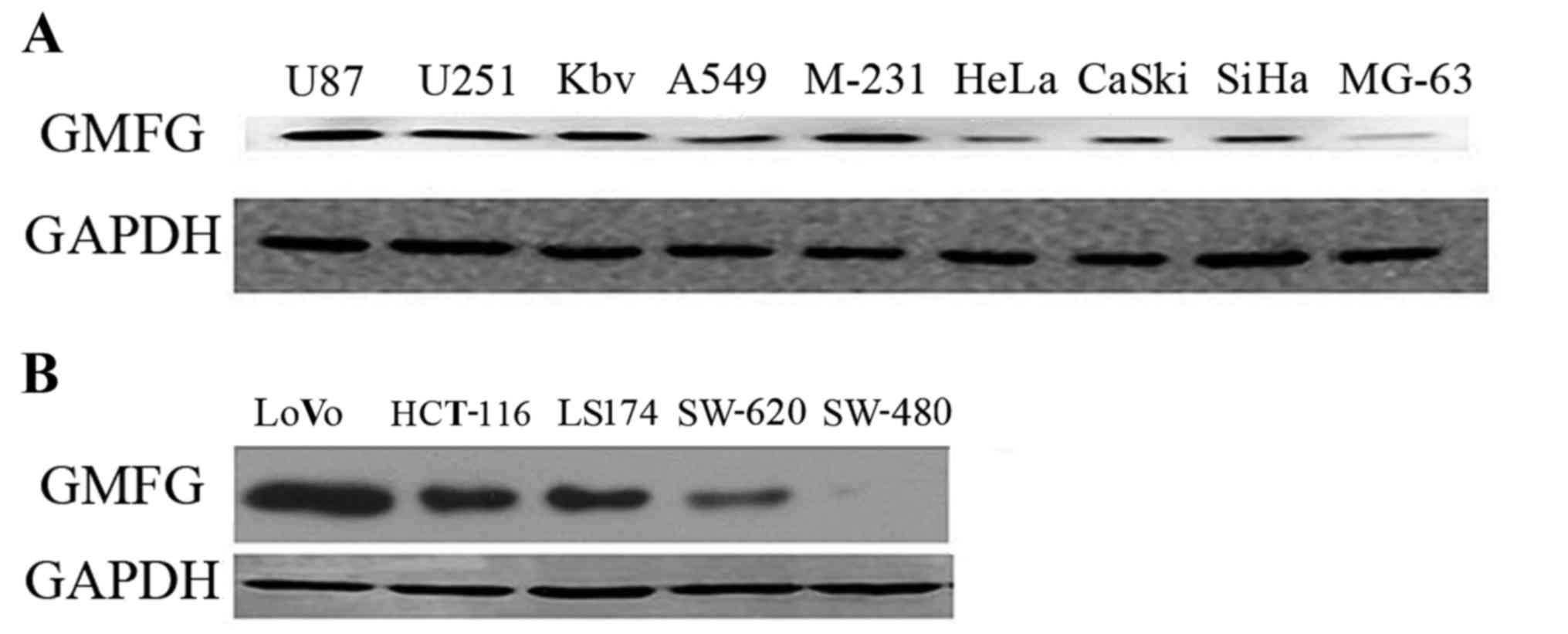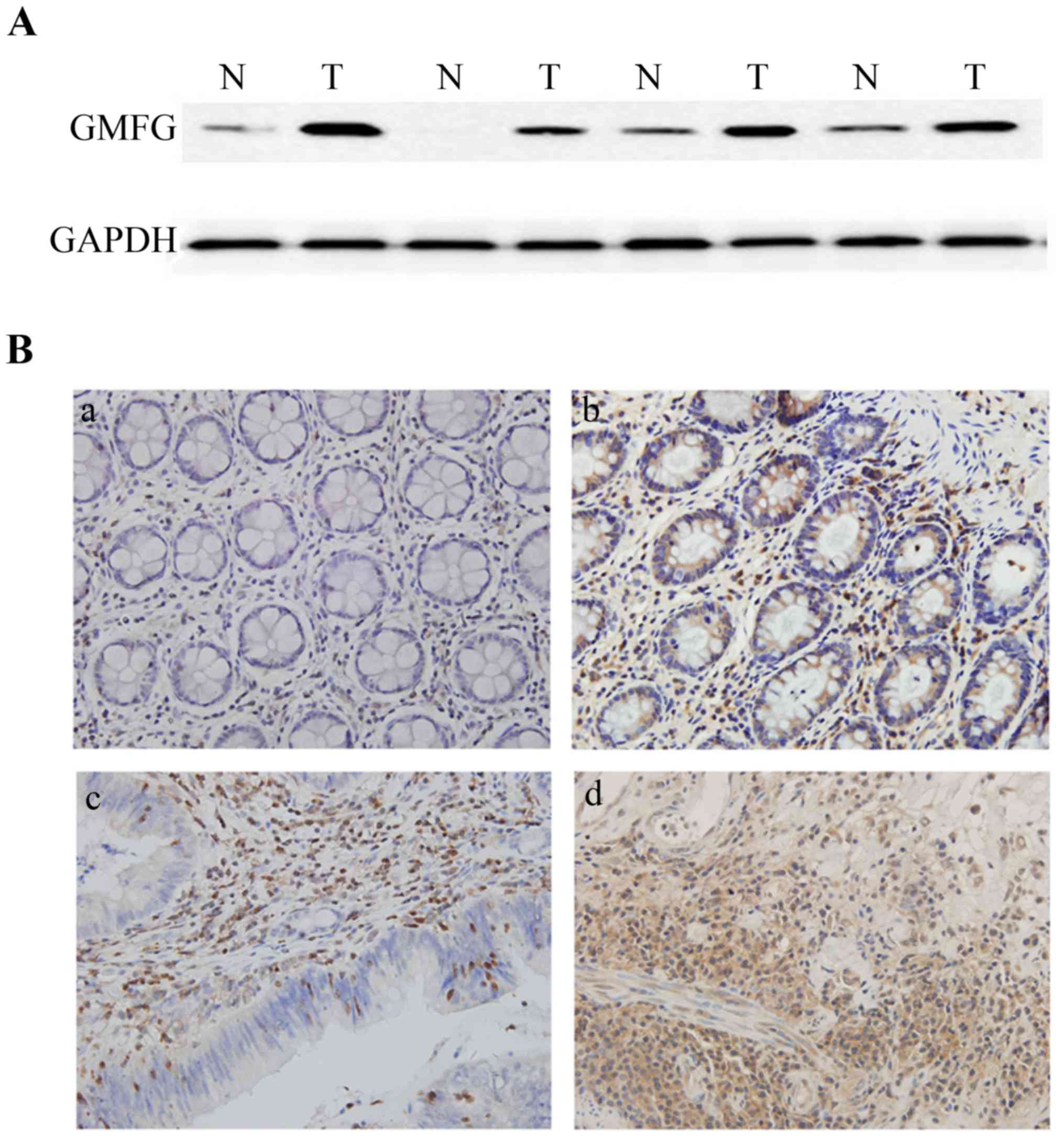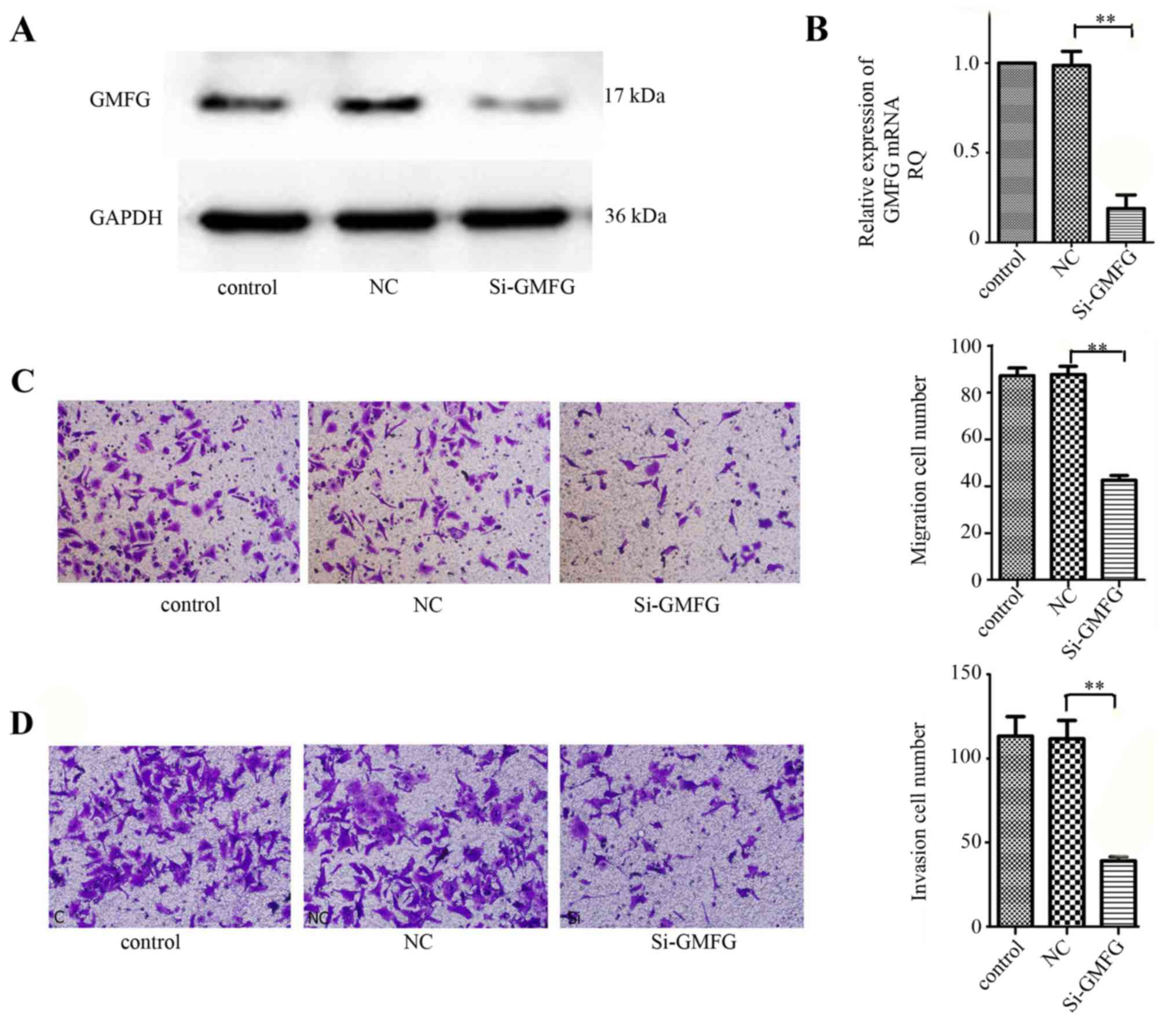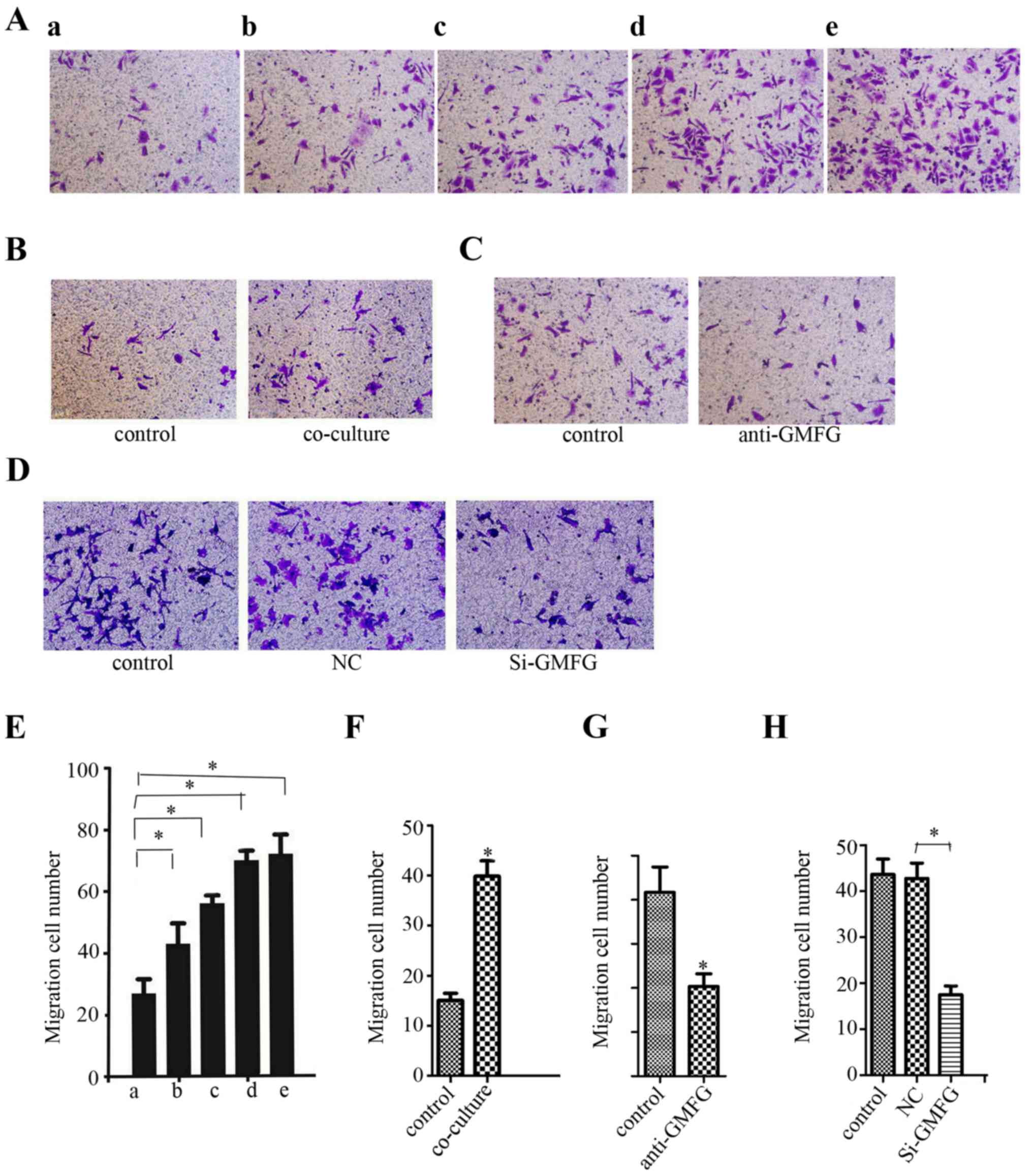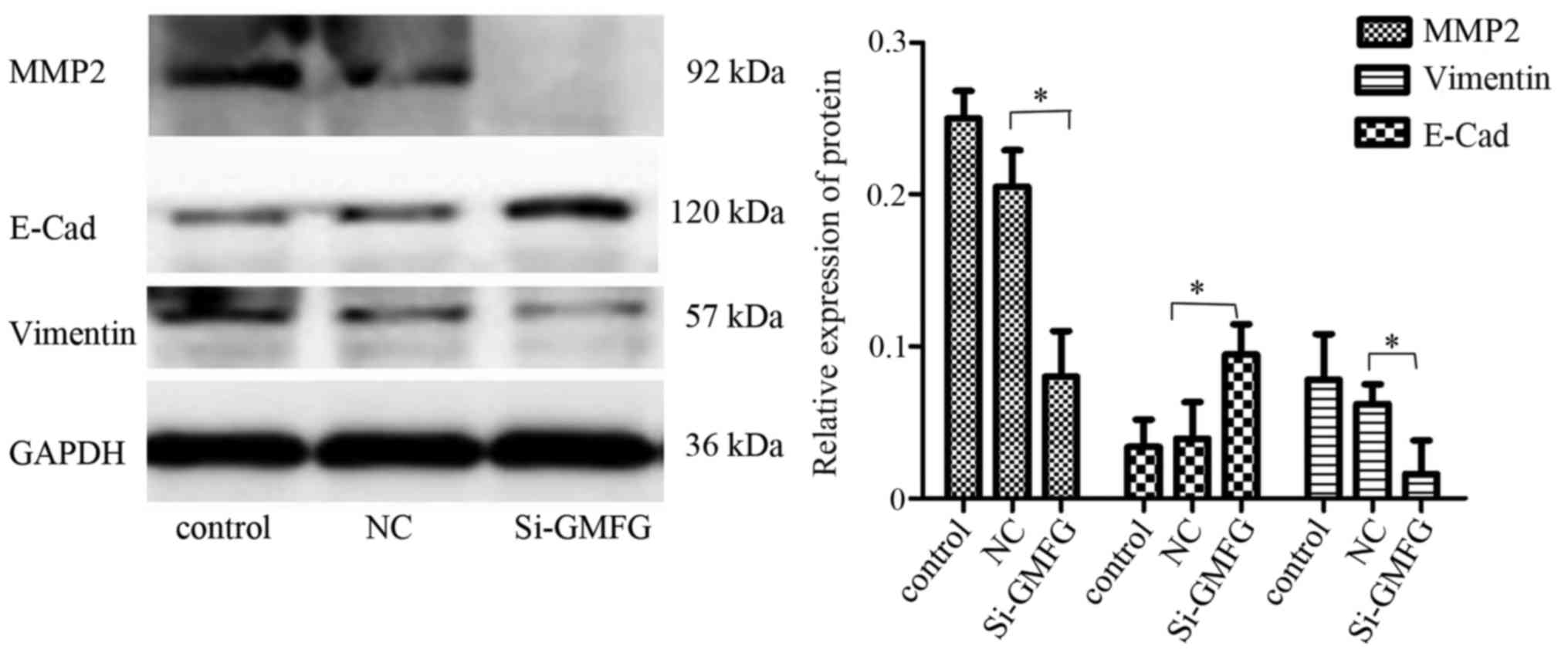|
1
|
Siegel RL, Miller KD and Jemal A: Cancer
statistics, 2016. CA Cancer J Clin. 66:7–30. 2016. View Article : Google Scholar : PubMed/NCBI
|
|
2
|
Ferlay J, Steliarova-Foucher E,
Lortet-Tieulent J, Rosso S, Coebergh JW, Comber H, Forman D and
Bray F: Cancer incidence and mortality patterns in Europe:
Estimates for 40 countries in 2012. Eur J Cancer. 49:1374–1403.
2013. View Article : Google Scholar : PubMed/NCBI
|
|
3
|
Shih IM, Zhou W, Goodman SN, Lengauer C,
Kinzler KW and Vogelstein B: Evidence that genetic instability
occurs at an early stage of colorectal tumorigenesis. Cancer Res.
61:818–822. 2001.PubMed/NCBI
|
|
4
|
Höglund M, Gisselsson D, Hansen GB, Säll
T, Mitelman F and Nilbert M: Dissecting karyotypic patterns in
colorectal tumors: Two distinct but overlapping pathways in the
adenoma-carcinoma transition. Cancer Res. 62:5939–5946.
2002.PubMed/NCBI
|
|
5
|
Hagland HR, Berg M, Jolma IW, Carlsen A
and Søreide K: Molecular pathways and cellular metabolism in
colorectal cancer. Dig Surg. 30:12–25. 2013. View Article : Google Scholar : PubMed/NCBI
|
|
6
|
Howlader N, Noone AM, Krapcho M, Garshell
J, Neyman N, Altekruse SF, Kosary CL, Yu M, Ruhl J, Tatalovich Z,
et al: SEER Cancer Statistics Review, 1975–2010. National Cancer
Institute; Bethesda, MD: 2013, http://seer.cancer.gov/csr/1975_2010/
|
|
7
|
DeBerardinis RJ, Lum JJ, Hatzivassiliou G
and Thompson CB: The biology of cancer: Metabolic reprogramming
fuels cell growth and proliferation. Cell Metab. 7:11–20. 2008.
View Article : Google Scholar : PubMed/NCBI
|
|
8
|
Willett WC: Diet and cancer: An evolving
picture. JAMA. 293:233–234. 2005. View Article : Google Scholar : PubMed/NCBI
|
|
9
|
de Jong AE, Morreau H, Nagengast FM,
Mathus-Vliegen EM, Kleibeuker JH, Griffioen G, Cats A and Vasen HF:
Prevalence of adenomas among young individuals at average risk for
colorectal cancer. Am J Gastroenterol. 100:139–143. 2005.
View Article : Google Scholar : PubMed/NCBI
|
|
10
|
Haggar FA and Boushey RP: Colorectal
cancer epidemiology: Incidence, mortality, survival, and risk
factors. Clin Colon Rectal Surg. 22:191–197. 2009. View Article : Google Scholar : PubMed/NCBI
|
|
11
|
Mao M, Fu G, Wu JS, Zhang QH, Zhou J, Kan
LX, Huang QH, He KL, Gu BW, Han ZG, et al: Identification of genes
expressed in human CD34+ hematopoietic stem/progenitor
cells by expressed sequence tags and efficient full-length cDNA
cloning. Proc Natl Acad Sci USA. 95:8175–8180. 1998. View Article : Google Scholar : PubMed/NCBI
|
|
12
|
Asai K, Fujita K, Yamamoto M, Hotta T,
Morikawa M, Kokubo M, Moriyama A and Kato T: Isolation of novel
human cDNA (hGMF-gamma) homologous to Glia Maturation Factor-beta
gene. Biochim Biophys Acta. 1396:242–244. 1998. View Article : Google Scholar : PubMed/NCBI
|
|
13
|
Shi Y, Chen L, Liotta LA, Wan HH and
Rodgers GP: Glia maturation factor gamma (GMFG): A
cytokine-responsive protein during hematopoietic lineage
development and its functional genomics analysis. Genomics
Proteomics Bioinformatics. 4:145–155. 2006. View Article : Google Scholar : PubMed/NCBI
|
|
14
|
Zuo P, Ma Y, Huang Y, Ye F, Wang P, Wang
X, Zhou C, Lu W, Kong B and Xie X: High GMFG expression correlates
with poor prognosis and promotes cell migration and invasion in
epithelial ovarian cancer. Gynecol Oncol. 132:745–751. 2014.
View Article : Google Scholar : PubMed/NCBI
|
|
15
|
Inagaki M, Aoyama M, Sobue K, Yamamoto N,
Morishima T, Moriyama A, Katsuya H and Asai K: Sensitive
immunoassays for human and rat GMFB and GMFG, tissue distribution
and age-related changes. Biochim Biophys Acta. 1670:208–216. 2004.
View Article : Google Scholar : PubMed/NCBI
|
|
16
|
Ikeda K, Kundu RK, Ikeda S, Kobara M,
Matsubara H and Quertermous T: Glia maturation factor-gamma is
preferentially expressed in microvascular endothelial and
inflammatory cells and modulates actin cytoskeleton reorganization.
Circ Res. 99:424–433. 2006. View Article : Google Scholar : PubMed/NCBI
|
|
17
|
Wang T, Cleary RA, Wang R and Tang DD:
Glia maturation factor-γ phosphorylation at Tyr-104 regulates actin
dynamics and contraction in human airway smooth muscle. Am J Respir
Cell Mol Biol. 51:652–659. 2014. View Article : Google Scholar : PubMed/NCBI
|
|
18
|
Aerbajinai W, Liu L, Chin K, Zhu J, Parent
CA and Rodgers GP: Glia maturation factor-γ mediates neutrophil
chemotaxis. J Leukoc Biol. 90:529–538. 2011. View Article : Google Scholar : PubMed/NCBI
|
|
19
|
Lippert DN and Wilkins JA: Glia maturation
factor gamma regulates the migration and adherence of human T
lymphocytes. BMC Immunol. 13:212012. View Article : Google Scholar : PubMed/NCBI
|
|
20
|
Zuo P, Fu Z, Tao T, Ye F, Chen L, Wang X,
Lu W and Xie X: The expression of glia maturation factors and the
effect of glia maturation factor-γ on angiogenic sprouting in
zebrafish. Exp Cell Res. 319:707–717. 2013. View Article : Google Scholar : PubMed/NCBI
|
|
21
|
Satelli A and Li S: Vimentin in cancer and
its potential as a molecular target for cancer therapy. Cell Mol
Life Sci. 68:3033–3046. 2011. View Article : Google Scholar : PubMed/NCBI
|
|
22
|
Arias AM: Epithelial mesenchymal
interactions in cancer and development. Cell. 105:425–431. 2001.
View Article : Google Scholar : PubMed/NCBI
|
|
23
|
Bates RC and Mercurio AM: The
epithelial-mesenchymal transition (EMT) and colorectal cancer
progression. Cancer Biol Ther. 4:365–370. 2005. View Article : Google Scholar : PubMed/NCBI
|
|
24
|
Turpeenniemi-Hujanen T: Gelatinases (MMP-2
and −9) and their natural inhibitors as prognostic indicators in
solid cancers. Biochimie. 87:287–297. 2005. View Article : Google Scholar : PubMed/NCBI
|
|
25
|
Shi M, Yu B, Gao H, Mu J and Ji C: Matrix
metalloproteinase 2 overexpression and prognosis in colorectal
cancer: A meta-analysis. Mol Biol Rep. 40:617–623. 2013. View Article : Google Scholar : PubMed/NCBI
|
|
26
|
Mook OR, Frederiks WM and Van Noorden CJ:
The role of gelatinases in colorectal cancer progression and
metastasis. Biochim Biophys Acta. 1705:69–89. 2004.PubMed/NCBI
|
|
27
|
Théret N, Lehti K, Musso O and Clément B:
MMP2 activation by collagen I and concanavalin A in cultured human
hepatic stellate cells. Hepatology. 30:462–468. 1999. View Article : Google Scholar : PubMed/NCBI
|
|
28
|
Langers AM, Sier CF, Hawinkels LJ, Kubben
FJ, van Duijn W, van der Reijden JJ, Lamers CB, Hommes DW and
Verspaget HW: MMP-2 geno-phenotype is prognostic for colorectal
cancer survival, whereas MMP-9 is not. Br J Cancer. 98:1820–1823.
2008. View Article : Google Scholar : PubMed/NCBI
|
|
29
|
Wang Z, Wang L, Hu J, Fan R, Zhou J, Wang
L and Zhong J: RARRES3 suppressed metastasis through suppression of
MTDH to regulate epithelial-mesenchymal transition in colorectal
cancer. Am J Cancer Res. 5:1988–1999. 2015.PubMed/NCBI
|
|
30
|
Thiery JP: Epithelial-mesenchymal
transitions in tumour progression. Nat Rev Cancer. 2:442–454. 2002.
View Article : Google Scholar : PubMed/NCBI
|
|
31
|
Kalluri R and Weinberg RA: The basics of
epithelial-mesenchymal transition. J Clin Invest. 119:1420–1428.
2009. View
Article : Google Scholar : PubMed/NCBI
|
|
32
|
Bravo-Cordero JJ, Hodgson L and Condeelis
J: Directed cell invasion and migration during metastasis. Curr
Opin Cell Biol. 24:277–283. 2012. View Article : Google Scholar : PubMed/NCBI
|
|
33
|
Grünert S, Jechlinger M and Beug H:
Diverse cellular and molecular mechanisms contribute to epithelial
plasticity and metastasis. Nat Rev Mol Cell Biol. 4:657–665. 2003.
View Article : Google Scholar : PubMed/NCBI
|
|
34
|
Pohl M, Radacz Y, Pawlik N, Schoeneck A,
Baldus SE, Munding J, Schmiegel W, Schwarte-Waldhoff I and
Reinacher-Schick A: SMAD4 mediates mesenchymal-epithelial reversion
in SW480 colon carcinoma cells. Anticancer Res. 30:2603–2613.
2010.PubMed/NCBI
|
|
35
|
Micalizzi DS and Ford HL:
Epithelial-mesenchymal transition in development and cancer. Future
Oncol. 5:1129–1143. 2009. View Article : Google Scholar : PubMed/NCBI
|
|
36
|
Huber MA, Kraut N and Beug H: Molecular
requirements for epithelial-mesenchymal transition during tumor
progression. Curr Opin Cell Biol. 17:548–558. 2005. View Article : Google Scholar : PubMed/NCBI
|
|
37
|
Bae GY, Choi SJ, Lee JS, Jo J, Lee J, Kim
J and Cha HJ: Loss of E-cadherin activates EGFR-MEK/ERK signaling,
which promotes invasion via the ZEB1/MMP2 axis in non-small cell
lung cancer. Oncotarget. 4:2512–2522. 2013. View Article : Google Scholar : PubMed/NCBI
|
|
38
|
Onder TT, Gupta PB, Mani SA, Yang J,
Lander ES and Weinberg RA: Loss of E-cadherin promotes metastasis
via multiple downstream transcriptional pathways. Cancer Res.
68:3645–3654. 2008. View Article : Google Scholar : PubMed/NCBI
|
|
39
|
Lu L, Xue X, Lan J, Gao Y, Xiong Z, Zhang
H, Jiang W, Song W and Zhi Q: MicroRNA-29a upregulates MMP2 in oral
squamous cell carcinoma to promote cancer invasion and
anti-apoptosis. Biomed Pharmacother. 68:13–19. 2014. View Article : Google Scholar : PubMed/NCBI
|















